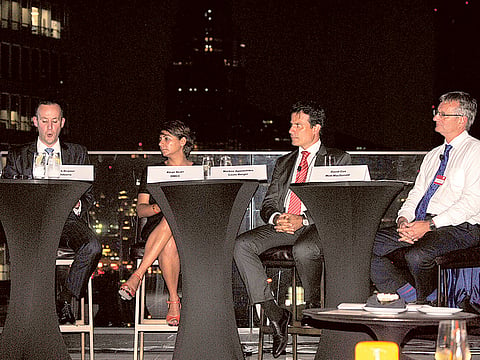Legislation not enough for PPP investors, expert says
Precedence and risk liability are also crucial factors

DUBAI: Legal frameworks alone are not enough to build effective public-private partnerships (PPP), a panel of experts said at the Dubai presentation of the Nabarro Infrastructure Index on Monday evening.
The UAE jumped seven places to take fifth spot in the index, which rates 25 nations on infrastructure investment attractiveness. Panellist Markos Apostolides, vice-president and managing director (UAE) for engineering and construction firm Louis Berger, said the UAE would remain an attractive environment for investors after the arrival of value-added tax (VAT). even if corporation tax were to be increased.
Saudi Arabia, rated for the first time, was in 13th place, with Qatar and Kuwait in 15th and 16th places respectively.
The report was explained and discussed at an event at the Luna Sky Bar, Dubai International Finance Centre, organised by the Dubai office of Nabarro, a London-based commercial law firm.
David Cox, managing director (Middle East and South Asia) of consultancy Mott MacDonald, said, “Legislation in itself will not create a pipeline for PPP projects. In other countries where we’ve had experience ... legislation was in place, lenders were in place, contractors were in place, but there was no framework of precedence. Laws were in place, but other laws such as land access were not in place.
“As advisers we took three years to help that legal situation become a practical tool before deals were closed. legislation alone will not create a pipeline.”
Cox added, “You need to have confidence that as you go into a procurement process with PPP you will not be engaged in a two or three year programme.”
He also cited clarity over risk liability as a concern for investors and contractors.
The panel also highlighted the increasing adoption of building information modelling (BIM) software, already required for large projects by Dubai Municipality, and the subject of a UAE steering group examining statewide adoption.
BIM software acts as a unified, detailed database throughout a project, including planning, design, construction and costing, ensuring the design team, contractors and subcontractors have access to the same information.
Kiran Scarr, General Counsel for Dubai Multi Commodities Centre (DMCC), said, “It’s a very exciting time to be in the construction industry, in the manufacturing industry, in the UAE. We [DMCC] looked into what is the future of trade, and trade is fairly relevant to the construction industry on the basis of procurement. What that report has said is that the future is embracing digital technology.
“At the moment the construction and manufacturing industry is at the bottom when it comes to adoption of digital technology. That’s globally.”
Scarr added, “We [DMCC] are requiring the adoption of BIM. The whole design and development process is radically going to change. Rather than being an iterative process where you’ve got traditional roles of all your project team, what you’re actually talking about now is a very collaborative and evolving process. If this is adopted on a mandatory basis by the UAE, which is what’s currently being discusses, that’s massive for the infrastructure sector here.
“Traditionally the model for Dubai development has been let’s build the biggest, let’s build the brightest, let’s do it quickest. It’s now going to be about sustainability and innovation, the key marker in your index. It’s going to be very different.”
Sign up for the Daily Briefing
Get the latest news and updates straight to your inbox



